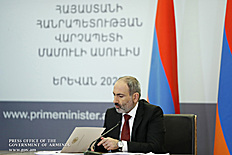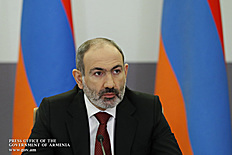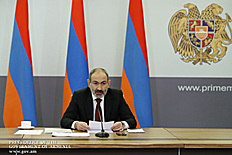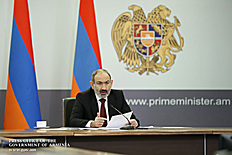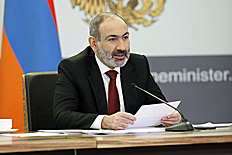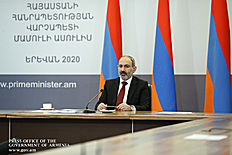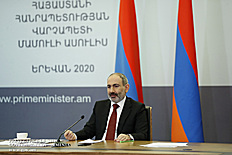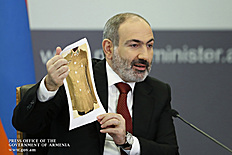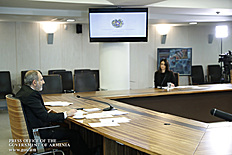more 7 photos
Prime Minister Nikol Pashinyan made public 100 facts about New Armenia during an online press conference held in Yerevan on May 16, 2020.
1. To minimize the adverse socioeconomic impact of COVID-19, the government has approved 18 anti-crisis programs: 7 economic measures and 11 social measures. As of today, 84.4 billion drams have been distributed in the frame of the anti-crisis efforts, benefiting 48,400 legal entities and about 1.1 million individuals.
With the first anti-crisis measure, the government subsidized the interest rates on loans worth 51.7 billion drams for 513 businesses, the whole part of which was obtained for the payment of salaries and taxes, the loan is available at 0%, raw materials, equipment, utility bills and food expenses. 6-10%, the loan is available at 2-6%. Up to 6 months grace period is provided for repayment of the principal amount of the loan.
2. With the second anti-crisis measure, the government subsidized the interest rates on agricultural loans worth 11.3 billion drams to 8195 businesses and individuals: the loan is available at 0%. In addition, the government has allocated 6 billion drams to the banking system to provide agricultural loans.
3. Mediating the third anti-crisis measure, the government subsidized preferential loans worth 8.3 billion drams to 744 economic entities with an annual turnover of 24 to 500 million drams. Loan interest rates will be 0% in the first year, 0% in the second year, 12% in the third year, no loan repayment in the first 6 months.
4. Under the 4th anti-crisis program, those parents who lost their jobs on March 13-25 received 100,000 drams for each child under the age of 14. 2093 citizens benefited from the event, 209 million drams were distributed.
5. With the 5th anti-crisis program, companies with 2 to 50 employees, where the number of employees and the payroll did not decrease within the past 3 months, received a grant in the amount of the salary of each 5th employee. 13,934 businesses with 78,412 employees benefited from the measure; 2.2 billion drams have already been distributed under the program.
6. Those who did not have children under the age of 14 and lost their job on March 13-30 received 68,000 drams each during under the 6th anti-crisis action. 7925 citizens used the program, 539 million drams were distributed under the program.
7. Under the 7th anti-crisis measure, those pregnant women who were unemployed as of March 30, and whose husbands did not have a job either, received 100,000 drams each. 9,475 women benefited from and 921 million drams were distributed under the program.
8. Employees and individual entrepreneurs in the affected areas identified by the government in the 8th anti-crisis event received support from employees - half of their registered salaries, 10% - individual entrepreneurs - quarterly turnover. 120828 citizens used the program, 8 billion 240 million drams were distributed, the average amount of support per person was 68,200 drams.
9. Under the 9th anti-crisis event, families with children aged 0-18, where both parents did not have a registered job, received 26,500 drams for each child. 166122 children benefited from the program, 4.4 billion drams were distributed.
10. Under the 10th anti-crisis activity, micro-enterprises received 10% of the quarterly turnover support. 6,157 economic entities used the program with a total budget of 317 million drams; each entity got 51,500 drams on the average.
11. With the 11th, 12th and 16th anti-crisis measures, 30-50% of utility bills were reimbursed for those utility customers whose:
- natural gas consumption did not exceed 40,000 drams in February;
- electricity consumption did not exceed 25,000 drams in February;
- drinking water consumption did not exceed 3000 drams in March
486,434 households benefited from the program; 4.7 billion drams were distributed.
12. Under the 13th anti-crisis measure, beneficiary families received 50 percent extra monthly allowance. 84,810 families used the program, 1.2 billion drams were distributed.
13. Under the 14th anti-crisis effort, 3,508 students studying in higher education institutions implementing higher education programs, whose grade point average (GPA) was above 90, received compensation for tuition fees for the second half of 2020. Undergraduate students were supported at the rate of at 75 percent, while graduate students got 100% compensation. Students with less GPA had the opportunity to use loans at 0-4% interest rate, the principal repayment of which will begin after graduation. The budget of the program was 1 billion drams.
14. Under the 15th anti-crisis program, tree planting will be implemented on highland riverbanks, which will generate about 1,000 jobs with a daily remuneration of 10,000 drams. The tree planting campaign will start on May 18.
15. High-tech companies will receive grants or co-financing of 10-30 million drams under the 17th anti-crisis event.
16. The 18th anti-crisis program provides that companies with 2 to 100 employees that did not resort to job cutbacks in February, March and April, and reduced their salary fund by no more than 5%, will receive a grant equal to the salary of every 5th employee.
17. As a result of the government-community-civil society-private sector cooperation, more than 50,000 food and hygiene items worth an average of 13,000 drams were provided to single elderly people, large vulnerable families and other disadvantaged groups, as well as to self-confined persons.
18. To alleviate the financial bottlenecks faced by those medical organizations involved in the state order program, 119 medical organizations will be financed on a prepaid basis by July 2020.
19. About 100,000 tests have been obtained to combat the novel coronavirus, and medical devices and personal protective equipment are still being purchased. In particular, additional 70 artificial lung ventilation devices will be supplied to Armenia. We plan to purchase new ambulances and high-capacity vehicles. In order to diagnose and treat the infection, procurements of mobile and electronic X-rays and other necessary medical equipment are underway. Production of protective masks has been launched in Armenia. The same goes for the production of alcohols.
20. Taking into account the need to prevent coronavirus and the current situation, an online learning platform has been launched in order to organize the educational process online in public schools, due to which the process of providing general education has not been disrupted. We are now taking steps to have the complete infrastructure of the distance education system by the fall so that the educational process is not disrupted, because there is a high probability that we will also have a coronavirus in the fall.
21. Following the state of emergency, Armenian banks and credit organizations offered credit holidays for the majority of borrowers. As of May 15, 485,000 individuals and more than 15,000 legal entities had been granted a credit holiday. 768,150 loans for individuals and 16,875 loans for legal entities were reconstructed.
22. The borrowers facing financial difficulties were given the opportunity to defer the repayment of mortgage loans for 6 months. The repayment of the principal of the loans provided under the National Mortgage Company and the Housing for Youth programs can be postponed for up to 6 months, i.e. until September inclusive.
23. As a result of the legislative changes, the calculation of the penalty for overdue tax liabilities for each day after April 20, 2020 will be calculated at 0.04% instead of 0.075%. The threshold for unfulfilled tax liabilities has been raised from AMD 500,000 to AMD 1,500,000 since April 20, 2020.
24. As of May 6, about 23,000 Armenian citizens had returned to the country since the declaration of the state of emergency in Armenia, amid numerous air travel disruptions and the closure of many companies.
25. In order to regulate the issue of food security, a 0% import duty rate is applied to a number of important goods imported into the customs territory of the Eurasian Economic Union from June 3. The class of these products includes potatoes, onions, garlic, cabbage, carrots, peppers, rice, buckwheat, baby food, as well as a number of medicines. In December 2019, an agreement was reached with other EEU countries to extend the privileges for 900 goods for Armenia, which were to be revised from January 1, 2020. The expected 0-5-0.6% rise in prices for these products has been neutralized.
26. As part of the global response to COVID-19, Armenia is actively cooperating with its partners and international organizations. In this framework, the European Union will provide a total of 96 million euros to Armenia, the United States - 1.7 million dollars, the World Bank - 3 million dollars in financial or logistical support. Due to the crisis, a number of international organizations and partner countries are planning to increase the amount of assistance provided to our country. In particular, the International Monetary Fund will step up the amount of financial assistance to USD 280 million.
An agreement on financial cooperation has been signed between the Federal Republic of Germany and the Republic of Armenia, which provides grants, technical assistance and soft loans to a total amount of over 91 million euros.
27. In 2019 the highest level of economic growth since 2008 - 7.6 percent – was recorded in Armenia, which is the highest performance registered in the EAEU-member nations, all neighboring countries and the European region. Economic growth was accompanied by an improvement in the line structure of the economy, low inflation and stable financial indicators. The manufacturing industry grew by 12 percent in 2019, for the first time since 2008 in the GDP structure by 12.1 percent, becoming the leading branch of the economy.
28. In 2019 the highest growth was recorded in the housing and catering services sector, which increased by 27.2% compared to the previous year. The 14-17% increase in the number of tourists visiting Armenia in 2019 significantly contributed to the growth of the sphere. Domestic tourism increased by 41% last year.
29. In 2019 4.9 million transactions were made with foreign bank cards in Armenia, which is an increase of 102% or 2.5 million transactions compared to 2017, and 48% or 1.6 million transactions compared to 2018. In 2019, 178 billion drams of transactions were received from foreign cards, which is 44% or 54 billion drams more than in 2017, and 28% or 38 billion drams more than in 2018.
30. According to the results of 2019, the export of goods and services from Armenia increased by 10.3%. Significant growth in exports was recorded by brandy (26.4%), fruit wines (70.8%), grape wine (25.3%) and products of plant origin (14.3%). It also increased exports of medium-tech goods by 26.9 percent and high-tech goods by 13.5 percent.
31. In 2019, the turnover of high-tech organizations increased by 30% compared to 2018. According to the Technological Administrative Register, the total turnover of information technology organizations in the first quarter of 2020, compared to the same period in 2019, increased by about 26%.
As of early May 2020, 31 start-ups in the IT sector have received tax benefits. The total number of companies that received a tax privilege in 2019-2020 was 261, creating more than 1,000 new jobs. About 20% of start-ups are founded by repatriates.
32. In 2019, the tax-to-GDP ratio was 22.3 percent, up 1.38 percentage points from the previous year's 20.95 percent, which is equivalent to 90.7 billion drams in additional tax revenues. According to the results of 2019, the amount of taxes paid by 1000 large taxpayers in Armenia amounted to 1 trillion 61 billion drams, which is 122 billion drams or 13% more than in 2018, and more than 254 billion drams or 31% more than in 2017.
33. In 2019 non-residents' bank deposits increased by 48% or 337 billion drams and amounted to about 1 trillion drams. This trend, on the one hand, is in line with the global practice of low capital flows from low-interest markets to high-interest markets, on the other hand, reaffirms the strengthening of confidence in Armenia's economy, including foreign businesses. At the same time, loans to non-residents increased by 3% or 7 billion drams to 245 billion drams.
34. The total amount of taxes paid to the state budget by 1000 large taxpayers in January-March 2020 amounted to 246 billion drams, which is 11.3% more than in the same period of 2019, and 37.4% more than in 2018. There has been a slight decrease in the disproportionate amount of taxes paid by companies included in the list of large taxpayers. The ratio of the total amount of taxes paid by the 10 largest and smallest companies on the list in January-March 2020 was 171 times, compared to 179 last year and 181 times in 2018.
35. According to data available in the first quarter of 2020, the budget revenues were exceeded by 8.9 billion drams. The index of tax revenues in the first quarter of 2020 exceeds the index of the first quarter of 2019 by 49.5 billion drams or 16.5%, and the corresponding indexes of 2018 by 60.5 billion drams or 25.3%.
36. In January-March 2020, 111.7 million cash register receipts were issued, which is 21.9% more than in the same period of the previous year. Fiscal turnover in cash register receipts published in January-March 2020 is 45.5 billion drams or 11.8% more than in the same period last year. In January-March 2020, 5.7 million documents were issued, which is 13.8% more than in the same period last year.
37. The share of overdue debt in loans provided by Armenian commercial banks decreased in 2019, reaching a record low of 0.85% in December. This index was 1% in December 2018. In March 2020, loans offered to legal entities and individuals increased by 20.3%, agricultural loans - by 14.3% as compared to the same month last year.
38. The banking system saw decreased dollarization level over the past 2 years,. The level of dollarization of loans provided by commercial banks in 2019 was 53%, instead of 59.5% last year. The level of dollarization of deposits in 2019 was 59.3%, instead of 60% last year. In 2017, the level of dollarization according to deposits was 62.4%.
39. Ardshinbank has successfully placed USD 300 million in Eurobonds over the past year, which is an unprecedented figure for a private Armenian company. This issue has been recognized as the best of its kind in Europe’s capital market and was awarded the Deal of the Year prize by The Banker, the world’s leading Financial Times Group business magazine.
40. As of January 1, 2020, the number of taxpayers was 138,000, which is about 27,000 more than last year. At the same time, the main part of the growth is conditioned by the activity of business entities. In particular, on an annual basis:
- The number of self-employed entities rose by about 15,700,
- The number of LLCs increased by about 5300,
- The number of CJSCs and OJSCs increased by 126 and 24, respectively.
41. The number of comprehensive tax inspections carried out by the tax authority decreased by 5.6% in 2019 as compared to the same period in 2018,. The amount of additional liabilities registered in the conditions of reduction of the number of complex inspections increased by 81.2%. At the same time, the amount of additional liability per inspection increased by 92%.
42. With the support of the European Union and the European Bank for Reconstruction and Development (EBRD) - € 16 million - the first private equity fund in Armenia (SME equity fund) has been launched in Armenia under the auspices of Amber Capital International Investment Company. The fund will raise a total of € 70 million to invest in small and medium-sized enterprises in Armenia, improve the competitiveness of beneficiary SMEs by improving corporate governance and transparency, thereby promoting the internationalization of SMEs.
43. The EU Council on Economic and Financial Affairs has decided to remove Armenia from the “gray list” of not cooperating countries. This fact is a good signal in terms of reputation, because our EU partners will consider Armenia as a tax-cooperating country.
44. For the first time in four years, the number of companies issuing shares listed on the Armenian Stock Exchange increased from 10 to 11, which, among other reasons, occurred as a result of income tax exemptions from the dividends of companies listed in the Tax Code. As a result, Armenia’s Doing Business performance will rise significantly.
45. In cooperation with the World Bank, the roads leading to Armenia’s main tourist destinations have been renovated or are under renovation: Tatev Monastic Complex, Sochut Dendropark, 6 streets in the Kumayri Historical District, Symphony of Stones natural monument, Khor Virap Monastery, Makaravank.
46. The process of switching to slaughterhouse industry continues. Today, there are 44 slaughterhouses in Armenia, 19 of which in services. 82 are under construction, at least 50 percent of which will start operating by July 1, and the rest will be operational by the end of the year. Note that Armenia needs at least 70-80 slaughterhouses.
47. In 2019, a significant change was registered in the diesel fuel market. In particular, the number of diesel fuel importers increased by 11, from 6 to 17, and the share of large importing companies decreased by 5%, from 97 to 92%. Increased competition, on the one hand, and global fuel price trends on the other hand have led to lower oil prices in Armenia. As of May 2018, the price of diesel fuel was 470 drams, and in May 2020 - 300 drams. Gasoline prices fell by about 38% in a year, falling from 420 drams to 280 drams.
48. The level of concentration has decreased in the butter market in 2019 as compared to 2018. The market share of the company with the largest sales volume decreased from 62% to 49%. At the same time, the average retail price of butter in 2018 was 4383 drams, in 2019 - 3906 drams, and now - 3680 drams. Compared to 2018, deflation was 16%.
49. In the sugar market, the level of concentration has decreased over the past two years, as a result of which the share of the entity with the largest imports and sales has decreased, from 67% to 49% in terms of imports and 88% in terms of sales.
As a result of the aforementioned restructuring and global trends, the sugar price fell by about 24% in the past two years.
50. Assisted by the State Employment Agency, 13,800 people out of 85,000 job-seekers found a job in 2019, or 45% more than in 2017 or 12% more than in 2018. It is noteworthy that in 2019, 7,497 job-seekers were included in the state employment programs, of which 4,600 beneficiaries were employed. The number of jobless people involved in employment programs is 4 times higher than in 2017 (1,759 unemployed) and 2.8 times greater than in 2018 (2,672 unemployed).
51. The threshold for granting family and social benefits has been lowered, as a result of which 11,000 families have retained the right to benefits amid increased pensions, while 1,000 new families have become system beneficiaries.
52. The costs of complicated and expensive medical care for contract servicemen and officers’ family members, including heart, brain and other 16 types of surgeries, will be fully reimbursed. Note that by the government’s decision, conscripts’ families have been benefiting from the state order since 2019.
53. Salaries of employees of penitentiary institutions have increased by 30% since January 1, 2020.
54. As of May 1, the salaries of about 230 employees of day care centers for children have been increased by an average of 30 percent. The average salary in orphanages of the general type became 130,900 drams, and in special type orphanages - 174,100 drams. The government has allocated 36.6 million drams to this end.
55. The scope of beneficiaries entitled to compensation for monetary deposits invested in the USSR Savings Bank before June 10, 1993 has been expanded. The amendment provides that compensation shall be offered to those domiciled in the border communities as of August 1, 2014, who were involved in hostilities, or who own plots of land not used due to hostilities. AMD 1.2 billion is envisaged for compensation in 2020,.
56. On the 75th anniversary of Victory in the Great Patriotic War, a lump sum amount of 300,000 drams was provided to 287 veterans.
57. A grant arrangement was signed with 12 NGOs in 2020 to provide care and social-rehabilitation services nationwide to about 460 disabled people (instead of last year’s 190).
58. The Government provides assistance to repatriated citizens of the Republic of Armenia in order to ensure their full social integration. The provision of temporary housing implies a subsidy of 60,000 drams for renting an apartment over a period of 6 months. The target group features those vulnerable citizens displaced or deported from foreign countries under readmission agreements.
59. The healthcare sector’s total turnover increased by 25.5% or 38.73 billion drams in 2019 as compared to 2017. During the same period, the number of healthcare workers increased by 3.4% or 1,377, and the average salary of healthcare workers increased by 29.5% or 46,500 drams.
60. The Government has approved a birthrate improvement program for 2020-2023, which specifies the terms and conditions for services provided by the state for early detection and treatment of reproductive disorders in specific groups. As a result, about 1,000 teenagers and 14,000 married couples will improve their reproductive potential each year, as well as about 2,500 to 3,000 women with prenatal losses and infertility.
61. The procedure of parallel imports of medicines was simplified to enhance the market competition. As a result, the wholesale prices of imported medicines fell by about 6% in 2019. In addition, 13% lower-cost medicaments have appeared on the domestic drug market.
62. From July 1, 2020, it will be possible to send the drug without additional examination, simply scan the QR code posted on the medicine box on the phone using the Tax Stamp mobile application and find out whether the drug being sold is certified and safe. This tool is an effective example of a combination of public and private control, which will keep the drug market from circulating unproven drugs.
63. Scholarships for postgraduate students and doctoral students will increase by 35,000 drams from September 1. Thereby, postgraduate students’ scholarships will almost double. The amount of the scholarship will be 65,000 drams in the field of Armenian Studies, 60,000 drams - for natural sciences and other professions, 55,000 drams - for economic and legal professions, as well as 65,000 drams for doctoral students.
64. The National Assembly has adopted a legislative regulation on the reimbursement of tuition fees for working students, which will return the income tax of persons studying at the same time in master’s, postgraduate and residency degrees.
The state has reimbursed the tuition fees of about 2,230 socially vulnerable students, as well as about 917 students of border or highland families, at a rate of 50-100 percent. The number of students who received compensation in 2019 was about 3147, the amount of tuition reimbursement was 654 million drams. The tuition fees of students with more than 2 children who served during the April war have also been reimbursed.
65. The honorarium for Armenian Olympic champions has doubled, amounting to 200,000 drams. Those athletes who won 2nd and 3rd prizes in the Olympic Games will be paid AMD 140,000 and 100,000, respectively. The world champions shall be provided 100,000 drams instead of AMD 55,000. From now on, each year the State will provide 5 million drams to the winners of the 10 Best Athletes of the Year award ceremony.
66. State budget funding for science increased by more than 1.5 billion drams in the 2020 as compared to the previous year. It will focus on the implementation of the Modernization of Infrastructure and Logistics in Science and New Scientific Topics in Contract-Based Research programs.
67. From March 1, 2020, retired persons can attend theatrical and concert performances, as well as visit museums free of charge.
68. In the Democracy Index 2019 published by the British Economist Intelligence Unit Research and Consulting Company, Armenia improved its position by 17 points ahead of all neighboring countries and ranked 86th instead of the previous report’s 103rd position.
69. According to the annual Democracy 2020 report published by the Varieties of Democracy, Armenia is among the four top countries boasting drastic progress in democracy. Armenia recorded significant progress in 5 of 6 indexes as compared to the previous year.
70. Armenia ranks 34th out of 180 countries in the Heritage Freedom Index 2020 published by the Heritage Foundation, moving from a group of “moderately free” countries to a group of “mostly free” countries. Compared to last year, Armenia has improved its position by 13 points.
71. According to the Bertelsmann Transformation Index for 2020, Armenia has made progress in all three criteria: in particular, our country improved its political freedoms index by 38 positions, the economic index- by 4 positions and the governance index – by 30 positions. Armenia ranks 34th in terms of political transformation, 43rd - in terms of economic transformation, and 55th - in terms of governance.
72. According to Freedom House’s Freedom in the World 2020 report, Armenia has improved its position by 2 points and continues in the group of “partially free” countries. According to the Transition Countries 2020 report published by the same organization, Armenia has recorded a record-high two-year improvement in history.
73. According to the Best European Countries for Business 2020 report, Armenia is among the countries that boast the greatest progress in this field. Our country has improved its overall standing by 6 points and now ranks 33rd.
74. According to the Transparency International Anti-Corruption Center’s Corruption Perceptions Index 2019, Armenia improved its index by 7 points and 28 positions compared to 2018, and now ranks 77th.
75. According to a report by the Friedrich Naumann Foundation and the Freedom Barometer Index as published by the authors of the Friedrich Naumann Foundation in Southeast and Southeast Europe, Armenia upgraded its index from 5’78 to 6’10 and now ranks 37th.
76. According to Freedom Barometer 2019, Armenia improved its position by 7.21 points as compared to the previous year, gaining 60.14 points, ranking 35th among 45 countries against last year’s 37th. The report states that only a small number of countries advanced in 2019 in ensuring the rule of law; Armenia and Northern Macedonia are vivid examples.
77. The range of customs privileges offered to repatriates was expanded and customs procedures were facilitated following the legislative changes approved by the National Assembly. In particular, the citizens of the Republic of Armenia, who have been absent from Armenia for the last year, are exempt from customs duties on goods imported for up to 5,000 euros. If a person has been absent from Armenia for at least 915 days during the last 5 years, he / she is exempted from the imported personal items - clothes, furniture, appliances, etc., as well as from customs duties for one car.
78. The number of applications for citizenship of the Republic of Armenia was 10,000 in 2017, 12,400 - in 2018, and 14,900 - in 2019. During the same years, the citizenship of the Republic of Armenia was granted to 8100, 9100 and 13000 persons, respectively.
79. The number of people prosecuted in recent years continues to decline. In particular, the number of convicts was 2410 in 2017, 1963 - in 2018, and 1556 - in 2019. Accordingly, we had 1410 prisoners in 2017, 1148 - in 2018, and 1037 - in 2019.
80. The type of correctional facility for 13 persons sentenced to life imprisonment by the Central Penitentiary Commission of the Penitentiary Service of Armenia has been changed to a semi-closed penitentiary with a milder degree of isolation from the strictest degree of isolation. It is an unprecedented event in the penitentiary system. In addition, two inmates were released on parole in 2020 due to positive behavior during the sentences.
81. Underway in Nubarashen and Armavir penitentiaries since 2019, the pilot program of outsourcing catering functions to private entities has a 100% index. The program’s high efficiency and the satisfaction voiced by the beneficiaries, in March, 2020 it was introduced in Abovyan and Goris, in April - in the Convicts’ Hospital, Yerevan-Kentron and Vardashen penitentiaries, and in May it will be come to be applied in Hrazdan and Sevan penitentiaries. As a result, 9 out of 12 penitentiaries will benefit from outsourced catering services. By June 2020, the new system will have been introduced in all of Armenia’s 12 penitentiaries.
82. In recent months, 11 subsoil use rights have been terminated, 4 of which - the right to operate 4 metal mines. Three of the mines were gold and one was a copper mine. 569 warnings were sent regarding the arrears of subsoil use payments, and 86 petitions were submitted in order not to eliminate the grounds for warnings in order to terminate the subsoil use right. As a result, about 695 million drams of debt was paid to the state budget of the Republic of Armenia.
83. In 2019, as part of the ongoing effort to increase efficiency in the management of water resources, liquidation of 8 deep wells and conservation of 43 deep wells were carried out in Ararat and Armavir marzes. 28 deep wells have been conserved at the expense of water users. 20 deep wells were brought to the shut-off mode. 3,017.8 l / s water was saved. 382 irregularities were identified.
84. In 2019, 1863 violations of environmental standards were registered nationwide, which is 71% more than in the previous year, on the basis of which 1228 administrative proceedings were initiated, an increase of 13.6%. 914 persons were fined instead of 774 in the previous year. In 2019, 1358 losses were exposed due to monitoring activities. The damage to the environment was estimated at 2,658.7 million drams, an increase of 64%. In 2019, 512.3 million drams was transferred to the state budget in terms of compensation for violations in the field of environmental protection as compared to AMD 172.6 million in 2018 and 63.7 million in 2017.
85. In 2019, the number of instances of illegal logging and poaching in Armenia decreased considerably, as a result of which the entry of people and equipment into forests has become more or less rare.
The availability of fodder for animals increased. The appearance of a Caucasian leopard in the area of Yenoqavan village of Tavush region may be a result of the above-mentioned positive factors and the restoration of the food chain. Thus, we can state that after a 50-year break, the leopard returned to Tavush region. The animal was last seen here in the 1970s. Tavush became the 4th region in Armenia where a leopard lives.
86. In 2019, about 500,000 trees were planted on an area of 160 hectares.
87. From January 1, 2022, the sale polyethylene bags thick up to 50 microns will be prohibited in commercial facilities and sales outlets, in accordance with the adopted decisions, including in the points of circulation.
88. 23 new combat (firing) positions were installed on the front line. 216 new modern video surveillance devices have been installed along the border: thermal imaging, daytime and combined cameras. 148 combat (fire) positions and bases were provided with industrial electricity, 235 with permanent water, 330 panels powered by blood energy were installed.
The Army has received 1,343 new vehicles and 33 units of engineering equipment. The process of substituting conscripts for combat duty servicemen continued, and the number of contract servicemen increased by 4.1%.
89. From June 2019, food supplies will be provided by 54 civil society organizations in the vast majority of military units, and from May 1, 2020, in 54% of combat duty positions. About 80% of conscripts now benefit from the new arrangement. We plan to apply the new system in all military units and combat positions by the end of the year.
90. We increased the amount of travel cost reimbursement for active service and contract servicemen leaving for a vacation as far as 350 km away from their military unit in the territory of the Republic of Armenia. The government’s relevant decision equally applies to Police and National Security Service troops.
91. According to preliminary estimates, corruption is predominantly behind the damage caused to the state or communities in the criminal cases investigated in 2019. The amount of embezzled funds stands at about 105.7 billion drams against nearly 85 billion drams in 2018. Damage worth about 12.4 billion drams has been restored. In order to recover the material damage caused to the state and communities in the criminal cases examined in 2019, 10.2 billion drams were seized on the accounts of the accused or defendants, movable or immovable property, which is 45.7% more than in 2018.
It is noteworthy that the total amount of damage caused to the state or communities within the framework of criminal cases investigated in 2018-2019 amounted to 190.7 billion drams, which is 5.2 times more than the amount of damage detected in 2009-2017 altogether, which is 36.5 billion drams; the recovered damage stands at 40.2 billion drams, the total result of the previous 9 years exceeds by 19 billion drams or about 90%
92. The National Assembly has approved a legislative arrangement criminalizing the public calls and the endorsement of such calls for violence against a person or group of persons. From now on, those spreading calls for violence or publicly justify violence will be sanctioned with a fine or sentenced to confinement of to one year in prison.
93. The National Assembly has approved the Law on Confiscation of Illegal Property, which provides for confiscation of such property worth 50 million drams and more. The law will apply to such unregistered property owned by politicians and businessmen that was acquired after September 21, 1991. A new competent authority shall be set up within the Prosecutor General's Office to probe into instances of confiscating illegal assets in favor of the state.
94. A new draft of declaration of property, income and interests of public officials has been developed and approved by the government, as well as the list of data to be published in the declaration. The new sample form includes data needed for qualitative analysis. Thereby, public officials will have to report information about the property owned at that time. In addition, property-related data will be collected throughout the year to detect the movement of transactions. The target group must provide information about the origin and the sources of their money.
95. The requirement to inform the business entity 3 working days before the checkup of their compliance with the applicable metrological rules and norms has been revoked, as a result of which the number of irregularities in gas stations and liquefied gas filling stations has sharply increased. The number of complaints has sharply decreased. Work is underway to introduce modern technologies in this area. The operations of faulty entities shall be suspended in case of violations.
96. For the first time in Armenia’s history, women have been appointed to the position of Head of Police Department in order to promote the government’s policy of increasing women’s involvement in all spheres of public life.
97. On April 24, 2020, a virtual Memory March was organized instead of the traditional march to the Tsitsernakaberd Memorial to commemorate the victims of the Armenian Genocide, which marked a new milestone in the commemoration of the victims of the Armenian Genocide.
98. As a result of tenders announced for the needs of the Armenian police in 2020, 1.4 billion drams were saved, amounting to more than 20% of the planned amount. As a result of organizational measures to increase fuel efficiency, 86,520 liters of fuel were saved in 2020.
From May 2020, the system of reimbursement of transportation costs for police officers, investigators, community policemen and other staff has been introduced. From May 2020, full compensation for rental of accommodation will be provided to those on active service or involved on a contractual basis in police troops.
99. The Armenian Prime Minister’s wife was fined by the police in the Kond government mansion for entrusting the wheel of a car to a minor in the yard of the Prime Minister’s residence.
100. The government has adopted the 2020-2023 housing program for families with children. The program provides that:
a) Families with 2 and more children will get lump-sum assistance in the amount of 5% of the price of the apartment, but not more than 1 million drams, after purchasing an apartment worth up to 30 million drams after July 1 of this year. In the case of every third child, the housing cost threshold will be raised by 5 million drams, and the amount of support can reach up to 2 million drams.
(b) Families with at least one minor child registered by July 1, 2020, may benefit from a mortgage loan prepayment insurance program. The amount of financial support is 90% of the prepayment insurance, but not more than 180,000 drams.
c) The beneficiaries should have made mortgage loan repayments for at least 12 months prior to July 1, 2020.
If the newborn child is the first or second child in the family, the support will be 10% of the remaining principal amount of the loan: 5% - in Yerevan, but not more than 500,000 drams.
If the child is the third and next child in the family, the support will be 50% of the remaining principal amount of the loan, and in Yerevan - 25%, but not more than 2 million drams.
In case the beneficiaries are below the age of 25 years, the amount of support will be 50% up the prescribed threshold, that is, if they had to receive 1 million drams, in this case they may be entitled to 1.5 million drams, and if he had to get 2 million drams, they may receive 3 million drams in support.
